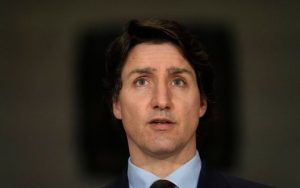
U.S. Quietly Asks Banks to Keep Some Ties With Russia – Bloomberg – Kyiv Post
According to a Nov. 7 report by the U.S. media publication Bloomberg, the U.S. Treasury, and therefore the U.S. State Department, have tacitly asked major banks, including J.P. Morgan and Citigroup, to maintain basic services to Russian companies not subject to direct sanctions.
U.S. Congressman Brad Sherman, a Democrat from California, pressed Dimon about whether his bank would cut ties with Russian firms like energy giant Gazprom PJSC during a seven-hour congressional hearing on Sept. 21, 2022.
Sherman claimed that financial institutions like Dimon’s were circumventing sanctions by operating in Russia despite that country’s attack on Ukraine.
“We are following the instructions of the American government as they asked us to do it,” Dimon replied before Sherman interrupted turning his attention to Citigroup Inc.’s Jane Fraser with related questioning.
The debate demonstrated how the nation’s biggest banks are stuck in the tug-of-war over sanctions between the Biden administration and Congress.
People with knowledge of the situation claim that the treasury and state departments have quietly urged major banking institutions like J.P. Morgan and Citigroup to maintain business relationships with a number of strategic Russian companies.
The administration is making a quiet effort to reduce the negative effects of the sanctions regime intended to punish Russia.
The administration is attempting to obstruct Russia’s advancements while averting a catastrophic global economic collapse, even as some in Congress pound the table for tougher sanctions against Russia.
“Congress needs to understand this — the U.S. government has not imposed a comprehensive embargo with Russia, there’s still pockets of business that are allowed,” said Nnedinma Ifudu Nweke, an attorney at Akin Gump Strauss Hauer & Feld LLP who focuses on U.S. trade and economic sanctions, in an interview.
The treasury department “will continue to have meetings to educate banks on those pockets of allowable transactions, especially in the humanitarian space,” Nweke explained.
The Biden government has reaffirmed its desire for banks and companies to continue channelling funds to Russia’s economy’s unapproved sectors. The breadth of its discussions with the banks, however, has not previously been disclosed.
Authorities from the treasury and state departments have urged lenders to keep providing fundamental services like U.S. dollar settlement, billing transfers, and trade finance options for Russian firms excluded from some facets of sanctions, such as Gazprom or fertilizer manufacturers Uralkali PJSC or PhosAgro PJSC, according to the individuals.
The dispute serves as a reminder of the delicate balancing act that banks and the government must perform in order to deny Russian President Vladimir Putin the funds he needs to finance the invasion while preventing more significant economic upheavals.
While they are largely withdrawing from Russia, they are also essential to maintaining global financial flow.
Citigroup had previously stated its intention to stop offering consumer banking in Russia long before the invasion. The business announced in August 2022 that it would close those operations as well as its commercial banking unit. Fraser announced a month ago that Citigroup would also cease operating its institutional operations in Russia as a follow-up to her initial statement.
Top management at Citigroup has spent months reducing operational processes in Russia, trying to offload derivatives, and reducing the company’s overall exposure to the nation from $9.8 billion at the beginning of the year to $7.9 billion by Sept. 30.
“We have been supporting our multinational clients in Russia,” Fraser stated last month. “We are now informing them that we will be ending nearly all of the institutional-banking services we offer by the end of the first quarter of next year. At that point, our only operations in Russia will be those necessary to fulfil our remaining legal and regulatory obligations.”
After the invasion, J.P. Morgan started to scale back most of its operations in Russia in a similar manner, though the company claimed limited activities would proceed.
When reached by phone, a spokesman for Sherman’s office said that they had no further comment. Representatives for Citigroup and J.P. Morgan declined to comment. A spokesperson for the treasury department said the department has required documents of the banking sector to ensure that activities for humanitarian aid, energy, and agriculture are authorized.


Average Rating